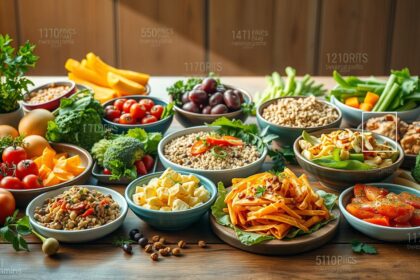The debate over supplements vs food is ongoing in health circles. People seek the best way to stay healthy, wondering if they should eat whole foods or take supplements. A diet rich in whole foods is key to good health. But, in today’s fast world, many think supplements might help fill nutritional gaps.
Whole foods give us a mix of nutrients that work together in complex ways. They include colorful fruits and veggies, lean proteins, and whole grains. Nature offers many ways to nourish our bodies. On the other hand, supplements are seen as quick fixes or ways to get specific nutrients.

We will look into the benefits of getting nutrients from food and the role of supplements in today’s diet. Understanding this balance is crucial for making smart health and diet choices.
Key Takeaways
- Whole foods provide a complex mix of nutrients that work synergistically
- Supplements can be useful for addressing specific deficiencies
- A balanced diet should prioritize nutrient-dense whole foods
- The bioavailability of nutrients often differs between food and supplements
- Individual needs may influence the choice between food sources and supplements
Understanding Essential Nutrients: The Building Blocks of Health
Essential nutrients are the foundation of our health. They fuel our bodies and keep us functioning at our best. Let’s dive into the world of vitamins and minerals to understand how they shape our well-being.
Macronutrients vs Micronutrients
Nutrients fall into two main groups: macronutrients and micronutrients. Macronutrients are the big players – carbs, proteins, and fats. We need them in large amounts. Micronutrients, like vitamins and minerals, are needed in smaller doses but pack a powerful punch.
Daily Nutritional Requirements
Our bodies need a mix of nutrients each day. For example, calcium keeps our bones strong, while b vitamins boost our energy. The exact amount varies based on age, gender, and lifestyle. A balanced diet usually covers these bases, but some people might need extra help from supplements.
| Nutrient | Daily Requirement (Adult) | Main Food Sources |
|---|---|---|
| Calcium | 1000-1200 mg | Dairy, leafy greens, fortified foods |
| Magnesium | 310-420 mg | Nuts, seeds, whole grains |
| B Vitamins | Varies | Meat, eggs, legumes, whole grains |
Role of Nutrients in Body Functions
Nutrients are the unsung heroes of our body. Calcium and magnesium team up for strong bones and muscles. B vitamins keep our nervous system running smoothly. Every vitamin and mineral plays a crucial role in keeping us healthy and energized.
Understanding these nutritional building blocks helps us make smart food choices. It’s the key to unlocking our body’s full potential and maintaining long-term health.
The Natural Benefits of Whole Foods
Whole foods are a nutritional powerhouse. They offer a mix of vitamins, minerals, and fiber that boost our health. Unlike processed foods, whole foods keep all their nutrients, making them the best for our bodies.
Fruits, vegetables, and whole grains are full of nutrients. They give us the vitamins and minerals our bodies need. For example, leafy greens are rich in iron and calcium. Berries are full of antioxidants that fight off harmful free radicals.
Whole grains are also key to a healthy diet. They have fiber, B vitamins, and minerals that refined grains lack. Eating whole grains can lower cholesterol and reduce heart disease risk.
“Let food be thy medicine and medicine be thy food.” – Hippocrates
Whole foods offer more than just the nutrients we need. They have compounds that work together to improve nutrient absorption and offer extra health benefits. This teamwork can’t be matched by supplements.
- Whole foods are rich in fiber, aiding digestion
- They contain phytochemicals that may prevent certain diseases
- Natural food sources provide a balanced mix of nutrients
By eating a variety of whole foods, we ensure our bodies get all the nutrients they need. This way of eating supports our health and can be tasty and fulfilling.
Why Is Food Better Than Supplements
Food is more than just nutrients. It’s a mix of nutrients that work together to keep us healthy. Eating whole foods is often better than taking supplements.
Bioavailability in Natural Food Sources
Our bodies absorb nutrients from whole foods better. This is because food has fiber, enzymes, and other compounds. These help us digest and use nutrients.
For example, iron from spinach is better absorbed with vitamin C-rich foods like citrus fruits.
Synergistic Effects of Food Components
Nutrients like vitamins, minerals, and antioxidants work together in food. This teamwork makes them more powerful than when taken alone. For instance, the nutrients in an apple interact in ways that boost their overall health benefits.
Complex Nutrient Interactions
Whole foods contain a wide range of nutrients that interact in complex ways. These interactions can enhance how well we absorb nutrients. Supplements often lack this natural balance, which can limit their effectiveness.
| Aspect | Food | Supplements |
|---|---|---|
| Nutrient Variety | Wide range | Limited |
| Absorption | Better | Variable |
| Synergy | Natural | Artificial |
By choosing a diet rich in whole foods, we can take advantage of nature’s perfect nutrient packages. This approach helps ensure we get the most from our meals and supports overall health.
Common Nutritional Deficiencies in Modern Diets
Our fast-paced lives often lead to poor eating habits, resulting in widespread nutritional gaps. Let’s explore some of the most common deficiencies and their impacts on our health.
Vitamin D Deficiency
Lack of sunlight and limited dietary sources make vitamin D deficiency a global concern. Many people turn to vitamin d supplements to boost their levels. Symptoms include fatigue, bone pain, and weakened immune function.
Iron Deficiency
Iron deficiency affects millions worldwide, mostly women and children. It can cause anemia, fatigue, and reduced cognitive function. While iron-rich foods are ideal, some may need iron supplements to address severe deficiencies.
B12 Deficiency Concerns
B12 deficiency is common among vegetarians, vegans, and older adults. It can lead to neurological issues and anemia. Fortified foods and B12 supplements are often recommended for at-risk groups.
| Nutrient | Common Sources | Symptoms of Deficiency |
|---|---|---|
| Vitamin D | Sunlight, fatty fish, egg yolks | Bone pain, muscle weakness |
| Iron | Red meat, beans, spinach | Fatigue, pale skin, shortness of breath |
| B12 | Animal products, fortified foods | Numbness, memory problems, depression |
While supplements can help, a balanced diet rich in whole foods remains the best defense against nutritional deficiencies. Folic acid, found in leafy greens and fortified grains, is another crucial nutrient often lacking in modern diets.
When Supplements Become Necessary
While a balanced diet is ideal, certain situations may require us to take supplements. Life stages, health conditions, and dietary restrictions can create nutrient gaps that food alone might not fill.
Pregnancy is a prime example when certain supplements may be crucial. Folic acid supplements can help prevent birth defects. Vegans and vegetarians might consider supplements to meet their B12 needs, as this vitamin is mainly found in animal products.
Older adults often need extra vitamin D and calcium to maintain bone health. People with limited sun exposure or darker skin tones may also benefit from vitamin D supplements.
- Pregnant women: Folic acid, iron
- Vegans: Vitamin B12, iron, zinc
- Older adults: Vitamin D, calcium
- Those with limited sun exposure: Vitamin D
Some health conditions can affect nutrient absorption. For instance, those with Crohn’s disease or celiac disease may need to take supplements to prevent deficiencies. Always consult a healthcare provider before starting any supplement regimen.
| Condition | Possible Supplement Needs |
|---|---|
| Crohn’s Disease | Vitamin D, B12, Zinc |
| Celiac Disease | Iron, Folate, Vitamin D |
| Osteoporosis | Calcium, Vitamin D |
Remember, supplements are not a substitute for a healthy diet. They’re meant to complement, not replace, whole foods. If you think you need to take supplements, discuss your options with a healthcare professional.
The Supplement Industry: Understanding the Market
The dietary supplement industry has grown a lot. Millions of people use supplements for their health. This industry has its own rules and faces challenges in quality and marketing.
Regulation and Quality Control
Dietary supplements don’t need FDA approval before they’re sold. They follow food standards, which can make product quality vary. Some companies get third-party certifications to show their products are safe and work well.

Marketing Claims vs Scientific Evidence
Supplement marketing often goes beyond what science supports. Some products have good research, but others make big claims without proof. It’s wise for consumers to be careful and talk to doctors before trying new supplements.
Cost Comparison with Whole Foods
Looking at the cost of supplements versus whole foods is important. Here’s a comparison:
| Nutrient | Supplement Cost (30 days) | Whole Food Cost (30 days) |
|---|---|---|
| Vitamin C | $10-$20 | $15-$30 (oranges) |
| Iron | $5-$15 | $20-$40 (lean beef) |
| Omega-3 | $15-$30 | $30-$60 (salmon) |
Supplements might seem cheaper, but whole foods offer more nutrients and health benefits. The supplement industry keeps growing, but eating a balanced diet is still the best way to stay healthy.
Risks and Side Effects of Supplement Use
Taking specific supplements can be risky. People may get too much of certain nutrients, like fat-soluble vitamins. These vitamins stay in your body longer and can build up to harmful levels.
Antioxidant supplements, once thought to be a cure-all, can have downsides. In high doses, they might increase cancer risk in some people. It’s crucial to talk to a doctor before starting any new supplement routine.
Supplements can also interact with medications. For example, vitamin K can reduce the effectiveness of blood thinners. St. John’s Wort, a popular herbal supplement, can interfere with birth control pills and antidepressants.
| Supplement | Potential Risk | Precaution |
|---|---|---|
| Vitamin A | Liver damage | Limit intake to recommended daily amount |
| Iron | Organ damage | Only take if prescribed by a doctor |
| Fish Oil | Bleeding issues | Consult doctor if on blood thinners |
Quality control is another concern. The FDA doesn’t regulate supplements as strictly as drugs. This means some products may not contain what they claim or might be contaminated. Always choose reputable brands and look for third-party testing seals.
Maximizing Nutrient Absorption from Food
Eating well is more than picking the right foods. It’s also about how you absorb nutrients from them. Knowing this can help you get the most from your meals.
Proper Food Preparation Methods
How you cook food can change its nutritional value. Steaming veggies keeps more nutrients than boiling. Cooking tomatoes boosts lycopene, a key antioxidant. Soaking nuts and grains makes more nutrients available.
Food Combinations for Better Absorption
Some foods pair better for nutrient absorption. Vitamin C foods with iron-rich foods improve iron absorption. Healthy fats help absorb vitamins A, D, E, and K. Try adding avocado to salads or nuts to oatmeal.
Timing of Nutrient Intake
When you eat is important too. Protein after a workout helps muscles recover. Fiber before meals controls blood sugar. Avoid processed foods at night to sleep better.
| Nutrient | Best Time to Consume | Reason |
|---|---|---|
| Protein | Post-workout | Aids muscle recovery |
| Fiber | Before meals | Helps control blood sugar |
| Carbohydrates | Morning or pre-workout | Provides energy for the day or exercise |
Using these tips can make your meals more nutritious. The secret to good nutrition is not just what you eat, but how you eat it.
Special Populations and Supplementation Needs
Some people need extra nutrients that food alone can’t provide. This includes pregnant women, older adults, and those with health issues. Let’s look into why and how to safely meet these needs.

Pregnant women need more folate for their babies’ growth. Older adults might find it hard to get enough vitamin B12 from food. People with food allergies might miss out on important nutrients by avoiding certain foods. Supplements can help fill these gaps.
Health professionals are key in guiding supplement use. They can spot deficiencies and recommend the right supplements. It’s vital to listen to their advice and avoid self-diagnosis.
Dietary guidelines help with healthy eating. But they might not fit everyone’s needs. Personalized advice is crucial here.
Fortified foods can also meet nutritional needs. These are regular foods with extra vitamins and minerals. They’re a good choice for those who prefer food over pills.
| Special Population | Common Nutrient Needs | Food Sources | Supplement Considerations |
|---|---|---|---|
| Pregnant Women | Folate, Iron, Calcium | Leafy greens, fortified cereals, dairy | Prenatal vitamins often recommended |
| Older Adults | Vitamin B12, Vitamin D, Calcium | Fortified foods, fatty fish, dairy | May need B12 supplements due to absorption issues |
| People with Food Allergies | Varies based on restricted foods | Alternative sources based on allergy | Targeted supplements to replace missing nutrients |
Remember, supplements aren’t a magic solution. A balanced diet should always be the first choice. Always talk to a doctor or dietitian before starting any new supplements.
Building a Nutrient-Rich Diet Naturally
Eating real food is key to a balanced diet. By focusing on whole, unprocessed foods, you can ensure your body gets a wide range of nutrients. Let’s explore how to build a nutrient-rich diet naturally.
Seasonal Eating Strategies
Eating seasonally helps you get the freshest produce packed with essential vitamins and minerals. In spring, enjoy leafy greens and asparagus. Summer brings colorful berries and tomatoes. Fall offers squash and apples, while winter provides citrus fruits and root vegetables.
Meal Planning for Optimal Nutrition
Plan your meals to include a variety of foods that provide a wide range of nutrients. Aim for colorful plates with fruits, vegetables, whole grains, lean proteins, and healthy fats. This approach ensures you eat real food and get all the nutrients your body needs.
Shopping Guidelines for Nutrient-Dense Foods
When shopping, focus on the perimeter of the store where fresh foods are typically located. Choose nutrient-dense options like:
- Dark leafy greens (spinach, kale)
- Colorful fruits and vegetables
- Whole grains (quinoa, brown rice)
- Lean proteins (fish, beans, lentils)
- Healthy fats (avocados, nuts, seeds)
| Food Group | Nutrient Benefits | Examples |
|---|---|---|
| Fruits | Vitamins, antioxidants, fiber | Berries, citrus, apples |
| Vegetables | Vitamins, minerals, fiber | Broccoli, carrots, sweet potatoes |
| Whole Grains | B vitamins, fiber, minerals | Oats, quinoa, brown rice |
| Lean Proteins | Amino acids, iron, zinc | Chicken, fish, legumes |
| Healthy Fats | Omega-3s, vitamin E | Avocados, nuts, olive oil |
By following these guidelines, you can create a balanced diet rich in essential nutrients without relying on supplements. Remember, the key is to eat real food and enjoy a variety of nutrient-dense options.
The Role of Fortified Foods in Modern Nutrition
Fortified foods are key in today’s nutrition. They are made richer with vitamins and minerals. This makes them a good choice for getting the nutrients we need, without supplements.
- Milk fortified with vitamin D
- Cereals enriched with iron and B vitamins
- Orange juice with added calcium
- Bread fortified with folic acid
Fortification helps fill nutritional gaps in our diets. It’s great for those who can’t get a variety of foods or have special diets. It adds important nutrients to common foods, helping public health and preventing deficiencies.
But, fortified foods shouldn’t be the only thing we eat. A good diet mixes natural and fortified foods. This way, we get all the nutrients we need for health. Always check food labels to avoid too much of any nutrient.
| Nutrient | Common Fortified Foods | Benefits |
|---|---|---|
| Vitamin D | Milk, yogurt, orange juice | Supports bone health, immune function |
| Iron | Cereals, bread | Prevents anemia, supports energy levels |
| Folic Acid | Bread, pasta | Crucial for fetal development, cell growth |
Fortified foods are a smart way to boost our nutrition. They fill the gap between whole foods and supplements. As part of a varied diet, they help us stay healthy and well.
Conclusion
The best way to get the nutrients we need is through a balanced diet. This diet should include lots of whole foods. Natural sources offer better bioavailability and complex interactions that supplements can’t match.
Eating a variety of fruits, vegetables, lean proteins, and whole grains is key. This provides essential nutrients in their most usable forms.
While supplements can help in some cases, they shouldn’t replace a healthy diet. For most people, getting nutrients from food should be the main goal. Proper meal planning, smart shopping, and mindful eating habits can help ensure you’re meeting your nutritional needs naturally.
Ultimately, the choice between nutrients from food or supplements depends on individual circumstances. For those with specific deficiencies or health conditions, supplements may be vital. But for the general population, focusing on nutrient-dense whole foods is the best way to achieve optimal health and well-being.



